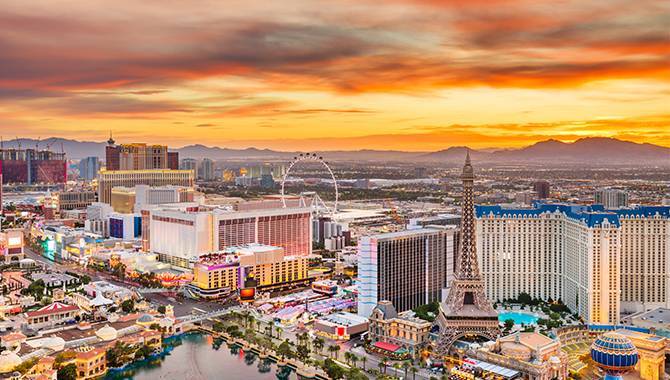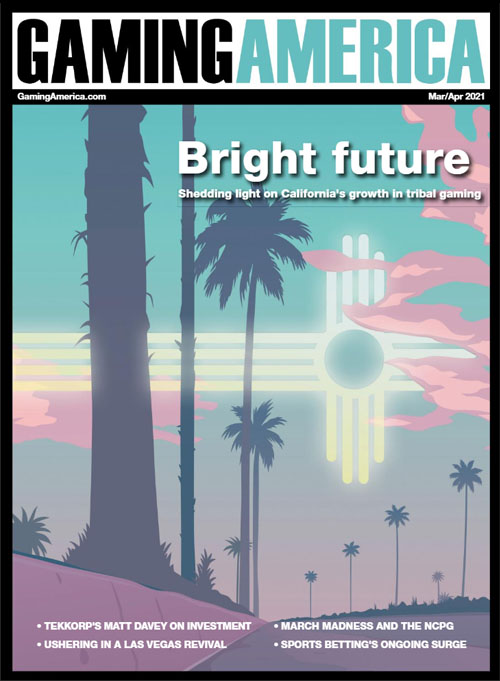
Some Las Vegas historians cite the importance of Howard Hughes in the evolution of Las Vegas. However not one of the six casinos he acquired is still standing today. Yet the lessons of Hughes’ legacy in portfolio ownership have gone unheeded. To recall The Strip in the 1990s, the key features that enabled growth were innovation and diversity in property ownership. The dominant corporations were Mirage Resorts and Circus Circus Enterprises, who held three casinos each. Caesars World/Park Place was constantly trading ownership up and down The Strip with Starwood and Hilton. Kirk Kerkorian’s second MGM Resorts posed a challenge from 1993 as well as various publicly-owned and operated companies like with Harrah’s/Promus’ Holiday Inn, Boyd’s Stardust, Aztar’s Tropicana and Coast Resorts. Even a few privately-owned properties existed, such as Engelstad’s Imperial Palace and Jack Sommer’s Aladdin.
Today, after a two-decades long acquisition frenzy, Caesars and MGM Resorts operate nine properties each on the resort corridor. As Hughes’ experience proved, consolidated ownership has led to a series of challenges.
In theory, within portfolio ownership, centralization of corporate functions allows efficiencies in operations and management, leading to cost reductions. However, casino ownership is not linear in terms of performance. Adding 100% more rooms does not necessarily offer 100% greater revenue. Moreover, operating multiple properties poses investment challenges as, for example, in many cases, capital investment in Caesars Palace or Bellagio will drive a higher ROI (based on property customer’s REVPAR) to shareholders than investment made in Paris or The Luxor.
We also note that innovation and advancing the business model has come from new players to market, notably Sheldon Adelson’s Venetian with its focus on conventions, and The Cosmopolitan in bringing in younger, urban customers.
In many cases, when specialist operators have opened resorts seeking to attract non-traditional customers, this has proved challenging. In recent times, Station Casinos, the specialist in operating local’s casinos, renovated and repositioned The Palms, and historically, Circus Circus Enterprises developed The Luxor to compete against the Mirage.
Thus, in a post-COVID environment with a scarcity of capital, holding a portfolio of properties in Las Vegas is the legacy position of opportunistic transactions, rather than good business principles and planning.
With the confluence of COVID-19 and emergence of REIT ownership, the opportunity and timing may be right for operators to rationalize their Las Vegas interests and enable new investors to market, with the benefits of new investment, new customers and new revenues.
The Desert Giant
With over 450 casinos of various shapes and sizes in over 40 states, gambling in Las Vegas is no longer a novelty reserved for Nevada. Internationally, Macau generates many multiples of gaming revenue compared to what Vegas’ $10.4bn does, with Singapore behind. But there are more reasons than just gaming to be in Las Vegas.
Las Vegas is unique. Pre-pandemic, national occupancy rates stood at 66.1% compared to 88.9% in Las Vegas. Las Vegas has over 150,000 rooms, with a further 5,000 rooms due to open throughout the course of 2021. By comparison, New York has 138,000 rooms and Greater London has 110,000. The 42.5 million annual visitors comprises of 14% international, 21% from California and 6.6 million conventioneers. The average visitor comes 1.7 times per year. Las Vegas is also centralized by geography and diverse in opportunity, unlike other major tourist cities. New York is highly granular and in Orlando, for instance, much of the most profitable elements in the market are operated in verticals by the likes of Disney.
With a strong, diverse, regular and loyal customer base, the Las Vegas market is highly attractive and should be at the forefront for any serious hospitality operator.
In terms of gaming and casino operators, the model has changed over decades. As noted, MGM Resorts built its business outwards with an established Las Vegas presence before expanding to regional markets. But we note that many of the main successes in Las Vegas are rooted in local and regional gaming. Perhaps the best example of the “hub and spoke” model is Harrah’s, which operated in key regional markets before coming to Las Vegas, via a strategy of acquisition, enabled by controlling customer behavior via its loyalty platform. Harrah’s acquired Park Place to form Caesars Entertainment, which was subsequently acquired by Eldorado Resorts, another regional gaming company.
Boyd Gaming, rooted in Downtown and the Las Vegas suburbs, exported its model to regional markets as gaming proliferated across the country. Penn National, also via acquisition, developed a strong regional casino platform before coming to Las Vegas.
The New Wave
The 2021 arrival of Resorts World and Virgin differ from past openings. Importantly, for the first time, a major Asian operator and a Native American Tribal operator are coming to Las Vegas to challenge the established order. Should they prove successful, Genting and Virgin will herald the beginning of a new wave of credible ownership and unprecedented investment in Las Vegas, with much of Tribal and regional gaming watching and waiting to see what happens.
The Chickasaw Nation operates Winstar in Oklahoma, the largest casino in the country. Other Tribes, including the Manuel Band of Mission Indians that operates San Manuel Casino, Pechanga Tribe of Luiseno Indians and Choctaw Tribe, could all follow the Seminole Hard Rock in expanding their footprint. Native American Tribes are the quiet giants in hospitality. They all have established customer databases, available capital, experienced management teams and operational expertise, to the extent that entering Las Vegas, with a transparent and open regulatory process, should be relatively straightforward.
Genting is relatively unknown in the USA but is a giants in Asia. It owns Genting Highlands, the largest resort in the world and Resorts World Sentosa in Singapore, only one of two casinos in the country. Genting is only one of several Asian colossuses with unlimited capital, with the potential to transform Las Vegas. If Resorts World proves successful, expect Asian interest in Las Vegas to be reignited.
Aiming Toward 2031
The COVID-19 crisis has led operators to review their business models and reassess their holdings in Las Vegas. The first realization was initially evident 50 years ago, that holding a portfolio of casino assets is not effective and does not offer shareholders best value. It causes challenges in capital investment, diminution of value and leads to a lack of innovation.
For those not currently in the market, a presence in Las Vegas offers a significant upside in revenues, status and investment diversification. These incentives together signal that there may be a time of great change ahead.
With more operators and increased competition, this outcome is good for customers and for Las Vegas itself, and will sharpen operator strategies with no more debacles such as parking fees. If 2021 proves successful for Genting and Virgin, expect to see a very different Las Vegas by 2031.

